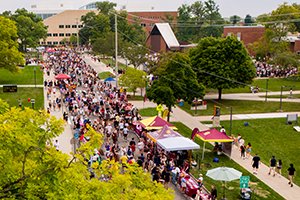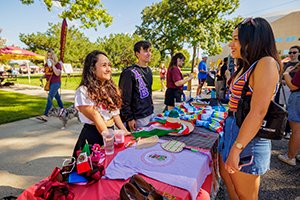How registered student organizations power campus life
The world of registered student organizations is your gateway to unique experiences, meaningful connections and personal growth. But what exactly is a "registered student organization?"
What is an RSO?

A registered student organization (RSO) is a university-recognized group of students brought together by a shared interest. These student organizations are the heartbeats of college campuses, breathing life into campus living with opportunities to engage, learn and make a difference.
Imagine this: you're stepping onto your university campus for the first time. Everything is new and a bit overwhelming, but you're excited to carve out your niche. This is where student organizations come in, ready to transform your college experience into something extraordinary.
Let's delve into how these student organizations energize campus life. You just might find your new home in one—or a few!
Why participate in campus life
Registered student organizations are more than just clubs—they're essential to shaping your college journey and enhancing campus life. These dynamic organizations give you the chance to explore your interests, develop skills and connect with others outside the classroom.
 Joining a small community can help you connect, build soft skills and boost your career prospects.
Joining a small community can help you connect, build soft skills and boost your career prospects.
Imagine increasing your chances of landing your dream job while making friends—sounds pretty great, right? It's not just talk– there's real data to back this up!
A study from Ohio State University found that students who join campus organizations are happier with their college life. According to the 2018-2019 Ohio State Graduation Survey:
- Students involved in at least one activity were 2.1 times more likely to feel satisfied with their college experience.
- They were 1.8 times more likely to secure a job offer by graduation.
- They were also 1.7 times more likely to consider grad school.
What can campus life do for you
Beyond the statistics, think about the skills you’ll build—like leadership, teamwork and communication. These are the kinds of qualities that make you stand out in job interviews and help you thrive in real-world challenges. Whether it’s organizing events, collaborating with a diverse group of peers or stepping into a leadership role, these experiences prepare you in ways that lectures alone can’t.
Here are a few categories of campus life niches you can discover:
Academic and personal growth
Student organizations are key players in your academic, social and personal growth. They offer real-world opportunities, allowing you to apply knowledge in practical scenarios. Picture yourself in a finance club like the Future Financial Advisors Association, where workshops on investment strategies turn theory into practice. By engaging with student organizations, you're setting the stage for a lifetime of learning and networking.
Leadership opportunities
Ever thought about being a leader? Student organizations provide the perfect training ground for roles like president, treasurer or event coordinator. These experiences hone skills like decision-making and communication that are vital for your future career. You can even join an organization like the National Society for Leadership and Success, designed to nurture your leadership potential.
Cultural enrichment and diversity
Student organizations play a crucial role in enhancing campus culture and diversity. They bring students from varied backgrounds together, celebrating inclusivity and fostering understanding. Cultural organizations, in particular, stand as beacons for inclusivity, hosting cultural festivals and panels that promote acceptance.
Community engagement and outreach
But student organizations don't just benefit you—they impact the broader community. Many student organizations organize events and initiatives that give back, strengthening the bond between the campus and local neighborhoods. Successful RSOs can leave a lasting impact far beyond campus. Take Penn State's Dance Marathon, or "THON." Every year, thousands of students participate in a 46-hour no-sitting, no-sleeping dance marathon that raises millions of dollars to support children and families affected by cancer.
Types of registered student organizations

Let's explore the vibrant ecosystems of RSOs, from academic and professional organizations offering career insights to cultural groups celebrating diversity. You'll find arts and performance ensembles, service and volunteer teams and hobby-based groups promising fun and camaraderie.
Academic and professional organizations focus on specific fields of study or careers.
- Offer networking opportunities, career advice and educational events.
- Example: Central Michigan's chapter of the American Chemical Society Student Members organizes guest lectures and research lab visits.
Arts and performance groups are tailored for students passionate about music, theater, dance or visual arts.
- Provide creative outlets through performances or exhibitions.
- Example: CMU's Trap Door Improv stages annual productions engage both participants and audiences.
Cultural and identity-based organizations celebrate diversity and foster inclusivity on campus.
- Host cultural festivals, awareness events and discussion panels.
- Example: Central Michigan's Latinx student organizations organizes Hispanic Heritage Month activities to promote cultural understanding.
Service and volunteer organizations give back to the community through projects and volunteer activities.
- Organize blood drives, community clean-ups and resource collection.
- Example: Many CMU clubs support initiatives like the Student Food Pantry.
Special interest and hobby-based groups bring together students with shared hobbies, from gaming and sports to environmental advocacy or trail hiking.
- Special interests can also champion pop-culture.
- Example: Some universities have Quidditch teams from the Harry Potter fandom.
Adding a new group to campus life
Starting a student organization is an exciting journey, but it comes with its share of challenges. Funding and maintaining member interest are two common hurdles you’ll likely face. Securing sponsorships or collaborating with other student groups can help tackle financial constraints. Keeping communication clear and engaging is key to ensuring your members stay active and motivated.
The future of student clubs lies in innovation. Digital tools like social media make it easier to connect with members and promote events. As student needs evolve, your club can play a key role in shaping campus life. With creativity, collaboration and determination, you can transform challenges into opportunities and create something impactful.
Registered student organizations at CMU
Our mission is to help you explore your passions and uncover new ones along the way. With over 300 student organizations to choose from—ranging from the Advertising Club to Zeta Theta Pi—there’s something for everyone. Whether you’re into social, athletic, artistic, professional or special interest groups, you’ll find plenty of ways to get involved and make the most of your experience.
So, why not take the leap? Joining an RSO could be one of the most rewarding decisions of your college career. Embrace the chance to grow, lead and build a community that supports and inspires you.